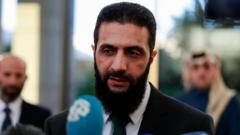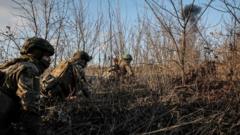This article explores the implications of Maxim Shugalei's recent detention in Chad, illustrating his complex role in Russia's geopolitical ambitions in Africa, ties to the Wagner Group, and the perception of Russian influence on the continent.
The Fallout of Maxim Shugalei: Russia’s African Influence on the Line

The Fallout of Maxim Shugalei: Russia’s African Influence on the Line
Maxim Shugalei, the controversial figure spearheading Russian influence in Africa, faces setbacks following his recent arrest in Chad, shaking the foundations of his operations.
Maxim Shugalei, dubbed Russia's African propaganda maestro, has found himself ensnared in controversy after his recent arrest in Chad. His escapades, often dramatized in bombastic propaganda films, portrayed him as a heroic figure embodying Russian strength abroad. However, reality bites as he has been caught amidst geopolitical complexities following his detention alongside fellow operatives Samer Sueifan and E Tsaryov in early September. After enduring two months of uncertainty, the trio was freed and returned to Russia earlier this month, according to the Russian embassy.
Shugalei presents himself as a "sociologist," yet analysts argue he operates primarily as a political spin doctor, working to fortify Russian influence in Africa, particularly through collaborations with the Wagner Group, a notorious mercenary outfit. Sanctioned by the EU and Ukraine due to his disinformation campaigns, Shugalei's entanglement with Yevgeny Prigozhin—Wagner’s orchestrator—fast tracks his notoriety. His earlier media exposure stemmed from his arrest in Libya, where he faced espionage allegations while attempting to aid the Gaddafi lineage.
This former hand of Prigozhin, whose posthumous shadow looms large, is said to have significant sway in promoting Russia's agenda across the African landscape, despite recent disruptions in his operations. Under Prigozhin, Shugalei helmed the Foundation for the Protection of National Values, a pro-Wagner organization. Since Prigozhin's death, Wagner's operational structure has undergone changes, integrating into Russia's official military.
With tight-lipped state responses concerning Shugalei's arrest in Chad, theories abound—some speculate it sparked from French intervention, while others consider the Chad government's apprehensions towards potential destabilization attempts by Shugalei and his propaganda maneuvers. His previous interactions in Chad include negotiations closely tied to the recent elections, indicating the depth of his involvement.
With the ongoing rivalry between the West and Russia unfolding in Chad, Shugalei represents a crucial pawn in Russia's endeavor to forge influence throughout Africa, particularly in the Sahel region. His provocative displays, from cultural initiatives like the Russia House to whimsical social media narratives, reflect the strategies employed in the broader geopolitical game.
In the wake of his arrest, it remains uncertain how Shugalei's influence will reverberate across the African landscape, as whispers of Russian disinformation infiltrate existing structures. Experts suggest that even with the apparent decline of his operations, Shugalei holds a relic of influence, a testament to the complicated web of relationships woven in the intricacies of African politics.





















